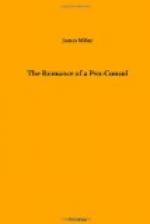’You had ice in such parts as the savage could not inhabit; bleakness eternal, with no promise of help in raising him to a higher life. Mostly, in the history of mankind, civilisation has grown in upon a country from several quarters. The contrary should be noted in respect to the lands, which, as we left Plymouth, seemed to us so attractive, so full of promise for generations yet unborn. We were to test that promise, and Darwin’s “Beagle,” having brought him home from a voyage, was to bear us on another.’
Sir George already knew Darwin enough to be a frequent caller on him in London. They discussed evolution, and a host of subjects in which Darwin manifested an interest. Sir George’s vignette of him was that he was one of the most amiable men it were possible to conceive. He was closely occupied with his own work, but that did not prevent him from being an informed observer of other things.
‘Of the advantages of association with master intellects,’ Sir George would say, ’I sought to make the best use. The three men who exercised most influence on me were Archbishop Whately, Sir James Stephen, and Thomas Carlyle, names which I revere. They denote characters who adorned the nation, and as for Carlyle, I can only describe him as a profoundly great figure. When I think of him, I immediately fly to Babbage, the inventor of the famous calculating machine. And I’m afraid I smile.’
The link lay in certain experiences which befell Carlyle and Babbage in the streets of London. The coincidence was notable, and, farther, Sir George thought it strange that each great man should have made him confidant. But he had delighted in receiving the confidences, proofs of their friendship, and with a mixture of gravity and amusement he had consoled the martyrs.
‘Being,’ he entered upon the tale, ’once introduced to Carlyle’s company, I think by Sir Richard Owen, it was my delight, during any spell in London, to visit him at Chelsea. Perhaps, as the matter has been long under review, I may remark that, to an outsider, no want of harmony was apparent, in the relations between Carlyle and his wife. You were not conscious of any element of that description; assuredly I was not, and I prefer to cling to that impression. Carlyle would sit at the right side of the fire, through an evening, I on his left, and we would talk on all manner of topics. I should most accurately describe our talk by saying that we philosophised. Or, we might read a little; he was a loving reader.
’Carlyle believed, with truth, that I had been influenced by his teachings, and if only for that reason he may have been rather fond of me. We lift our hats, to ourselves, as reflected in somebody else. I had a regard for him as a man, I gladly looked up to him, though that did not block out differences of opinion; and altogether we got on admirably. During one of those fireside talks, he detailed to me an incident, which quite hurt his feelings.




